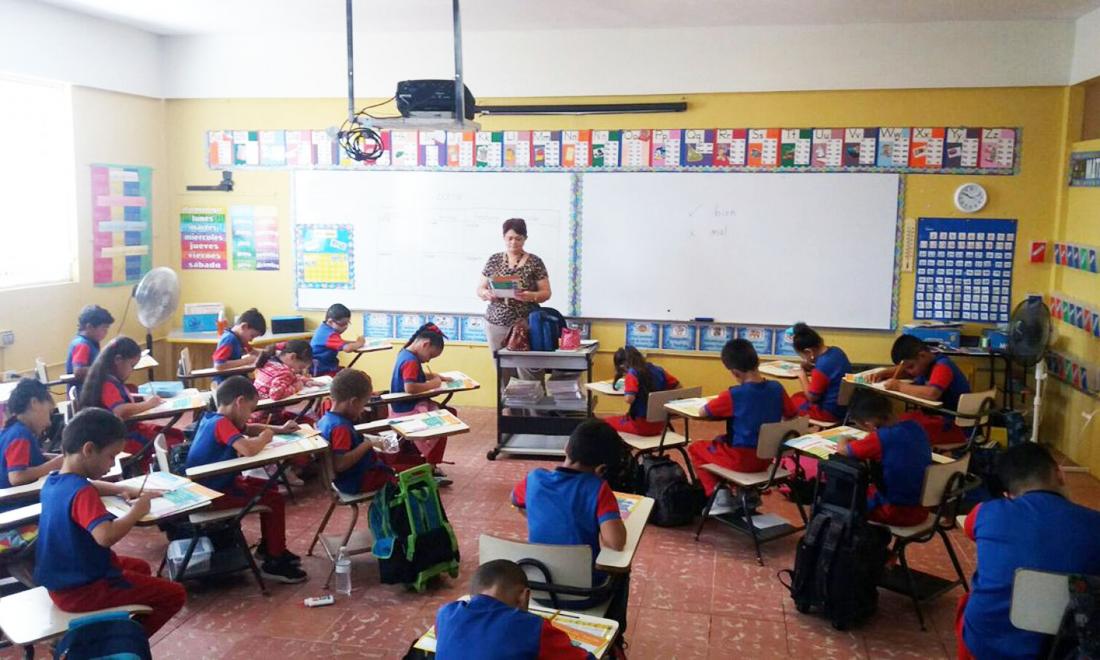Principal Training to Improve Student Achievement in Puerto Rico
- Primary schools
- Secondary schools
- Student learning
- Training
- Administrative reform
- COVID-19 response
Management practices in public education can impact student performance and school quality. While attempts to improve management practices in educational contexts have been shown to significantly improve school quality and student achievement in the short-term, many of the practices resulting from such initiatives are often not sustained in the long-term. Researchers are evaluating the impact of changes in school management practices on student outcomes over time by introducing a large-scale principal training program for school directors in Puerto Rico and testing different strategies to sustain improved management practices after the program.
Policy issue
A growing body of evidence establishes that principals are often instrumental leaders in efforts to improve school quality and student achievement. Previous research has shown that implementing changes in school management practices can lead to improved student performance, but these improvements are not sustained in subsequent years. Additional research highlights the difficulty of changing behavioral patterns and the importance of reminders, monitoring, and external reinforcement. The government of Puerto Rico’s policy priorities include strengthening school leadership quality in order to improve educational outcomes through a program called the Academia de Desarrollo Profesional de la Educación para la Gestión de Liderazgo y la Profesionalización (EDUGESPRO). Researchers are testing this large-scale management training program and its effects on student achievement.
Context of the evaluation
The Government of Puerto Rico’s Department of Education has long faced challenges that have historically resulted in low student performance. In 2016, 49 percent of students scored proficient or better in Spanish, 42 percent of students scored proficient in English, and only 33 percent scored proficient in mathematics on standardized tests. Additionally, Puerto Rico’s annual dropout rate is eight percent—compared to the 5.4 percent overall dropout in the United States.1 On time graduation hovers around 74 percent, as compared to the 85 percent on time graduate rate in the United States.2 These challenges were compounded by a series of natural disasters, including Hurricane María in 2018, damaging earthquakes in January 2020, and the onset of the Covid-19 pandemic in March 2020.

Details of the intervention
Researchers are conducting a randomized evaluation to determine the impact of the management training program on student achievement and school quality. For this evaluation, researchers are randomizing approximately 850 schools and principals stratified by academic level, school region, and school-level academic performance at baseline.
Schools within each stratum are assigned to one of three experimental arms. The two treatment groups receive intensive management training with post-training reminders. The management training and subsequent adoption reminders are being rolled out to the two different groups over the course of two years, respectively in Academic Years 2019-20 and 2020-21. The intensive management training involves a two-week intensive seminar training in the summer, followed by a series of biweekly workshops during the academic year focused on personnel management, instruction planning, goal setting and monitoring, school culture, and personal leadership.
The research team helped inform the curriculum based on the team’s analysis of baseline levels of management practices adoption as measured via a specialized survey. Post-training reminders consist of text messages reminding principals of management practices and tailored tips based on specific needs of the schools. The control group receives a placebo treatment: a set of administrative and basic management training sessions.
Researchers will measure the impact of the intervention on school management practices using the Development-World Management Survey instrument, as well as teacher performance and student achievement as measured by standardized exams.
Results and policy lessons
Evaluation ongoing; results forthcoming.
